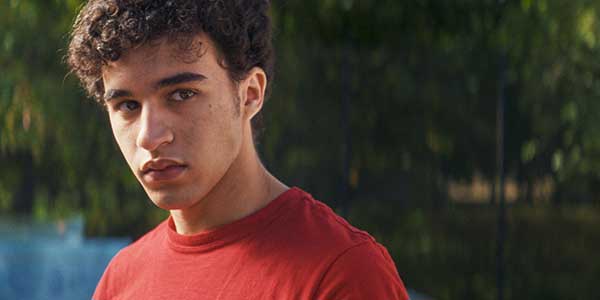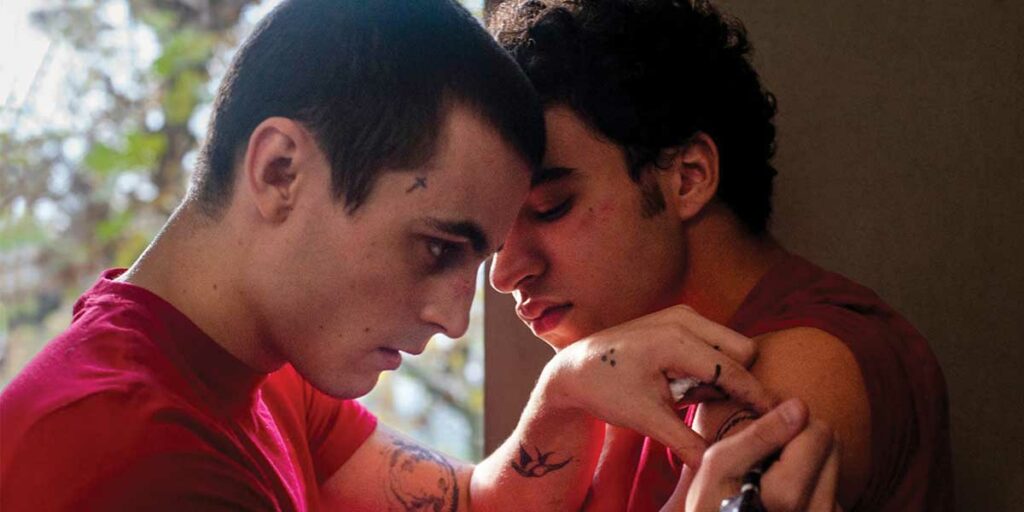In The Lost Boys, Zeno Graton shares a powerful love story in an unlikely place where the desire for romance and freedom come together.
“If a fish is caught into a block of ice, it never comes back to life; it dies,” is one of the opening lines of The Lost Boys (Le Paradis). While the film is most definitely not about fish but, rather, focused on a young couple, this line stayed with me throughout the movie as it defines its themes from the very beginning. This analogy with the fish made me immediately transfer that to the context of the film, already sparking a reflection on the value of incarceration: can these people ever come back to a normal life? Zeno Graton asks his audience this question as the film progresses.
The Lost Boys is set in a youth correctional facility where the main character, Joe (Khalil Ben Gharbia), dreams of freedom and the outside world as he prepares to leave the juvenile centre behind and return to society, thanks to the guidance of the instructors at the centre. The arrival of William (Julien de Saint Jean) seems to change everything as a romance develops between the two behind cell cells and fences. Now Joe is torn between the promise of freedom, one that is so near, and the hope he feels with William who has just arrived at the centre and will not be leaving with him.
The opening shots of The Lost Boys are very significant and certainly amongst the most powerful cinematography throughout the movie. Not only do they serve to narratively establish the – rather narrow – setting in which this story will take place, the youth correctional facility where Joe and William meet, but they also immediately create a harrowing and claustrophobic environment. With only a few shots, we can already understand Joe’s need for freedom and his desire to see the world as the majority of these shots are focused on the fences and security system, thus conveying the idea that it is not a place the characters can leave from.

The heart of the film is the blossoming romance between Joe and William. As The Lost Boys progresses, the audience is introduced to the world of the youth correctional facility made up of rule after rule, including the complete ban on any physical contact. It is a world hostile to hope and love, where a romance feels like the least likely thing that could happen in such a hopeless place. And yet Joe and William still managed to find each other: with their romance comes the hope for a better future, one that could look different than the lives they have led so far.
The Lost Boys raises an interesting debate about the value of incarceration and rehabilitation. At first, it seems like the youth correction facility truly has their best interests at heart, looking after their education and well-being. However, we also get to see the structural flaws within this system as ultimately it is most likely going to fail them, much like the characters the audience can’t help but feel that their future is already sealed and set up for failure. While it is hinted at in one of the most powerful sequences of the film, I wish the distrust these kids eventually feel towards this unjust system was explored more.
The Lost Boys is a beautiful film with an interesting and unique setting, one that is particularly relevant in an age where underage crime is seemingly rampant. As such, it is a movie that makes us reflect on the question of incarceration, its value – if any – and the rising rates of juvenile crime. It also feels very timely as Italy just passed a new legislation making it easier to arrest children as young as 14 years old as the current government believes they should be punished as adults. The question that comes naturally in light of this news and having seen this film is: why is the focus of these conversations always on punishment rather than the rehabilitation and integration into society of these people?
The Lost Boys will be screened at the 2023 BFI London Film Festival and will be released in cinemas in the UK & Ireland and on digital platforms on 15 December 2023.

